Rug Pull Risk Scanner
Project Risk Assessment
Red Flag Analysis
Every week, new cryptocurrency projects promise life-changing returns. You see the tweets, the Discord hype, the influencer posts - a token jumps 50x in hours, and suddenly everyone’s talking about it. But behind the excitement is a quiet, deadly pattern: rug pull. In 2024 alone, over $126 million was stolen through rug pulls, and more than 90 scams were recorded. These aren’t rare glitches - they’re engineered exits, designed to trap you before you even realize you’re in danger.
An Anonymous Team Is the Biggest Warning Sign
If you can’t find the real names, LinkedIn profiles, or past work of the people behind a project, walk away. Legitimate teams don’t hide. Even privacy-focused projects like Monero have known contributors with verifiable track records. Rug pulls thrive on anonymity because it gives scammers a free pass to vanish. No name means no accountability. No reputation to protect. No legal risk. In crypto, anonymity isn’t always bad - but when paired with a token that’s pumping fast and promises 100x returns, it’s a red flag flashing in neon.Price Spikes in Hours? That’s Not Growth - It’s a Trap
A token going from $0.001 to $0.05 in 24 hours sounds like a dream. But in reality, it’s a classic pump-and-dump. Scammers buy their own tokens in bulk using wallets they control, then flood social media with fake news and influencer shoutouts. They create the illusion of organic demand. When new investors jump in, the original team dumps their holdings all at once. The price crashes. The liquidity pool dries up. And you’re left holding a token worth pennies. Real projects grow slowly. They earn traction through utility, not hype. If the price chart looks like a rocket launch, it’s probably a bomb.100x Returns? That’s Not a Promise - It’s a Scam
No legitimate investor guarantees 100x returns. That’s not finance - it’s fantasy. Rug pull teams know people are desperate to get rich fast. So they sell dreams: “Earn 5% daily!” “Exclusive access to the next Solana killer!” “Guaranteed profits!” These aren’t investment pitches. They’re psychological traps. Legitimate DeFi protocols offer yields based on real economic activity - staking rewards, liquidity mining, protocol fees. They don’t promise impossible numbers. If a project’s whitepaper reads like a casino ad, it’s not a project - it’s a trap.No Smart Contract Audit? Don’t Touch It
Smart contracts are the code that runs a token. If it’s not audited by a trusted firm like CertiK, PeckShield, or Trail of Bits, it could be rigged to steal your money. Audits don’t guarantee safety - but they’re the bare minimum. Rug pulls often include hidden functions: code that lets the owner mint unlimited tokens, freeze your wallet, or block you from selling. Without an audit, you’re investing blind. And if they show you an “audit” from a company you’ve never heard of - check the website. Many fake audits come from sites created just for the scam. Real audits are public, detailed, and downloadable.Team Holds 30%+ of Tokens? That’s a Time Bomb
If the development team owns more than 10-15% of the total supply - and there’s no vesting schedule or lockup - you’re at risk. Think of it like this: if you’re the only one who can sell the stock in a company, you can crash it anytime. That’s exactly what rug pull teams do. They hold the majority of tokens, wait for you to buy in, then dump them all at once. Look for projects that lock team tokens for 6-12 months or more. Even better - if the team renounces ownership entirely, that’s a strong sign they’re serious about the project surviving without them.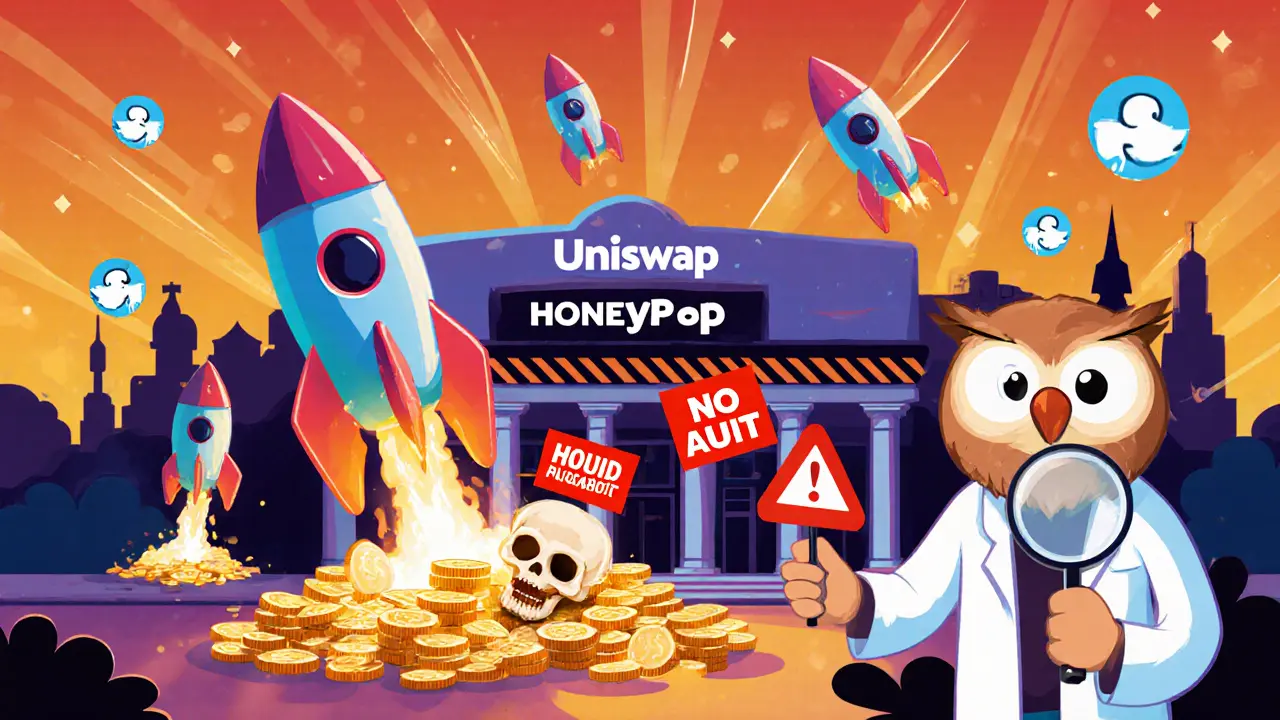
Listing on Uniswap or PancakeSwap? That’s Not a Feature - It’s a Risk
Centralized exchanges like Binance or Coinbase review projects before listing. They check for legal compliance, team background, and code security. Decentralized exchanges like Uniswap and PancakeSwap? Anyone can list a token in minutes. No ID. No paperwork. No oversight. That’s great for innovation - but terrible for safety. Rug pulls live here because it’s easy to create, promote, and disappear. If a project is only on a DEX and has no plan to list on a centralized exchange, treat it like a high-risk gamble - not an investment.Fake Websites, Fake Partnerships, Fake Bots
Scammers spend money on professional-looking websites, whitepapers, and Twitter accounts. But look closer. Is the whitepaper copied from another project? Are the “partnerships” with big names like Coinbase or Binance - but no official press release exists? Are the Discord and Telegram channels full of identical posts: “TO THE MOON!” “100X!” “BUY NOW!” - with zero technical discussion? That’s bot traffic. Real communities ask questions. They debate. They analyze. Fake ones are echo chambers designed to drown out doubt. Check the project’s GitHub. If it’s empty, or hasn’t been updated in weeks, the project isn’t being built - it’s being sold.Locked Liquidity? If Not, It’s Not Safe
Liquidity is the pool of funds that lets you buy and sell a token. In a legitimate project, this liquidity is locked - meaning the team can’t pull it out. Platforms like Unicrypt and Team Finance provide verifiable lockups. You can see the date it unlocks and who holds the key. If a project says “liquidity is locked” but gives no proof - or worse, uses a self-declared lock that anyone can cancel - don’t trust it. A project that can remove liquidity at any moment is one that can rug you at any moment.Sudden Silence After the Hype? That’s the Exit
Before the launch, the team is everywhere. Daily updates. Live Q&As. Promises of big milestones. Then, after the token pumps and they’ve collected enough funds? Silence. Discord goes quiet. Twitter stops posting. Telegram admins vanish. The website goes down. That’s not a delay - that’s the rug pull. Real teams communicate through good times and bad. Scammers only talk until the money’s in.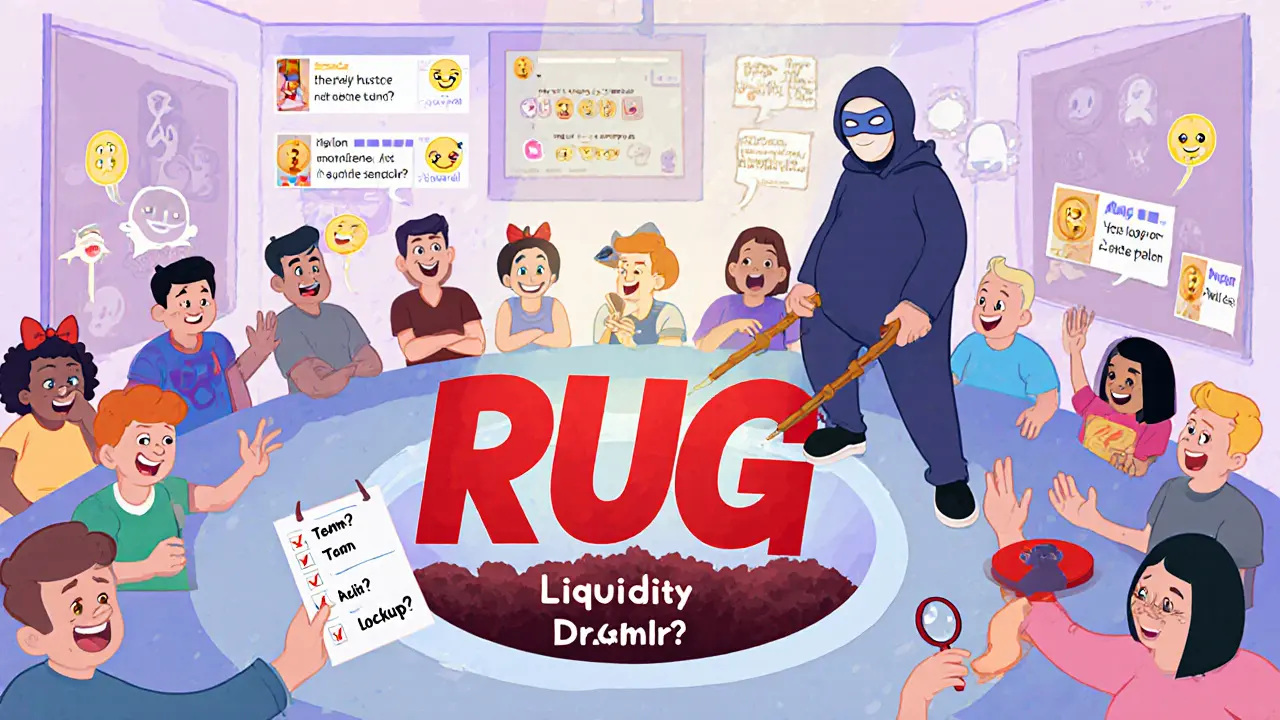
Code That Lets You Buy But Not Sell? That’s a Honeypot
This is one of the most technical but deadly signs. A honeypot is code that lets you buy the token - but when you try to sell, it fails. Maybe it requires a special token you don’t have. Maybe the sell fee is 99%. Maybe your wallet gets blacklisted. This isn’t a bug. It’s intentional. You’re not investing - you’re being trapped. Tools like Etherscan or BscScan let you check contract code. If you’re not a developer, use sites like RugDoc.io or TokenSniffer. They scan contracts for honeypots and other traps. If it says “high risk” - walk away.No Legal Info? No Accountability
Legitimate projects have terms of service, privacy policies, and often even company registration numbers. They disclose jurisdiction. They include risk disclaimers. Rug pulls have none of this. Why? Because they don’t plan to be around when you come asking for your money back. If you can’t find a legal entity, a registered address, or any mention of compliance - you’re dealing with a shell. Crypto isn’t lawless, but scammers exploit the gray areas. Don’t be the one who fills them.Community That Bans Questions? That’s a Cult, Not a Project
Real communities welcome skepticism. They answer hard questions. They admit risks. Fake ones ban anyone who asks, “Who’s the team?” or “Why is there no audit?” If your Discord mod deletes your comment for asking about token distribution, that’s not moderation - that’s control. A healthy community is made of users, not shills. If everyone’s posting the same memes and emojis, and no one’s talking about how the tech works - you’re not part of a movement. You’re part of a marketing funnel.What Should You Do Instead?
Don’t chase pumps. Don’t follow influencers without checking their history. Don’t invest more than you can afford to lose. Use tools like DeFiLlama to see real TVL (Total Value Locked), not hype. Check CoinGecko or CoinMarketCap for verified listings. Look for projects with real use cases - DeFi protocols that lend, swap, or insure. Avoid tokens that exist only to be traded. And always, always do your own research. No one else is responsible for your money but you.How do I know if a crypto project is a rug pull before I invest?
Check for an anonymous team, no smart contract audit, unrealistic return promises, and no locked liquidity. Look at the token distribution - if the team holds over 15% without vesting, it’s risky. Use tools like RugDoc.io or TokenSniffer to scan the contract. If the project is only listed on decentralized exchanges like Uniswap and has no GitHub or real documentation, treat it as high-risk.
Can a rug pull happen after I’ve already invested?
Yes. Many rug pulls are soft - meaning the team slowly drains liquidity over weeks or months. They keep the website up, post fake updates, and pretend everything’s fine while quietly selling their tokens. This is harder to spot than a hard rug pull, where everything crashes instantly. Always monitor liquidity locks and team wallet activity. If you notice large sells from team wallets, exit immediately.
Are all tokens on Uniswap rug pulls?
No. Many legitimate DeFi projects start on Uniswap because it’s open and permissionless. But the lack of oversight makes it the most common place for scams. Always verify the project’s team, audit, liquidity lock, and code before investing - even if it’s on a major DEX. Never assume safety just because the platform is popular.
What’s the difference between a rug pull and a failed project?
A failed project stops development and the token loses value, but the team doesn’t steal funds. A rug pull is intentional theft. The team builds hype, collects your money, then drains the liquidity or locks your ability to sell. The difference is intent. Failed projects are sad. Rug pulls are criminal.
Is it possible to recover money lost in a rug pull?
Almost never. Rug pulls are designed to be untraceable. Developers use mixers, offshore wallets, and fake identities. Law enforcement rarely recovers funds unless the scam is massive and involves identifiable individuals - which is rare. Prevention is your only real protection. Once the rug is pulled, it’s too late.
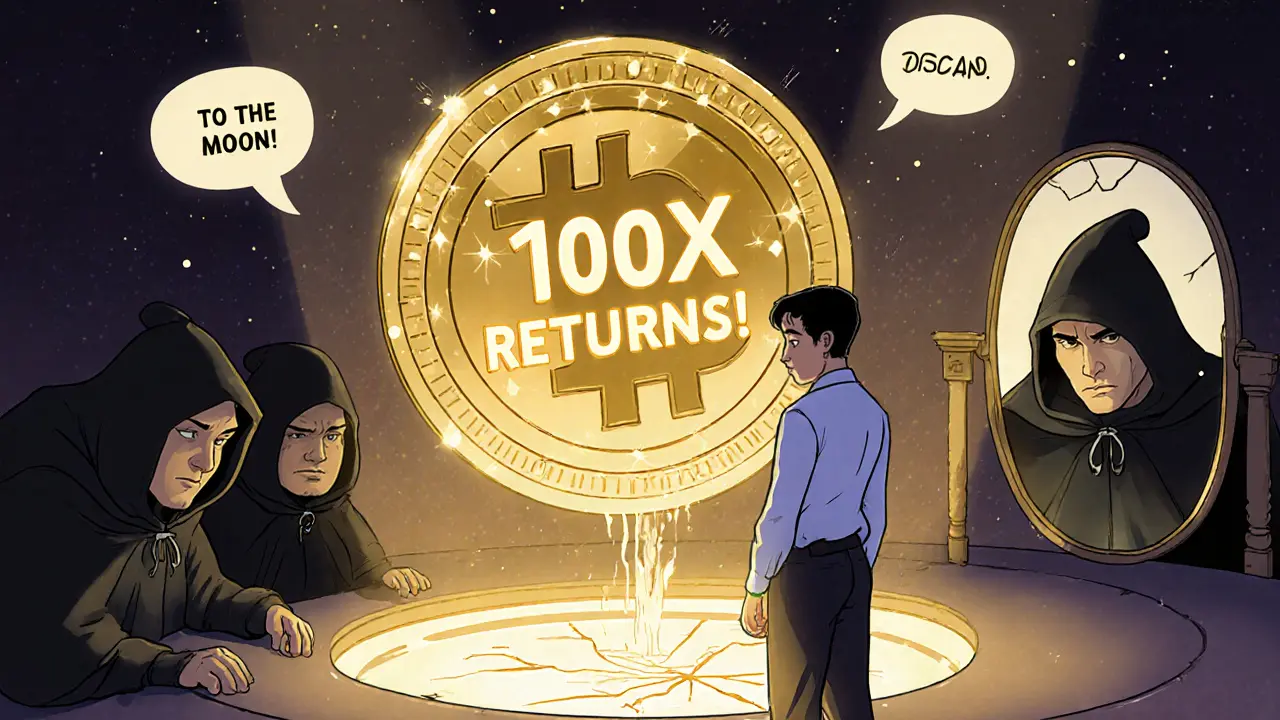
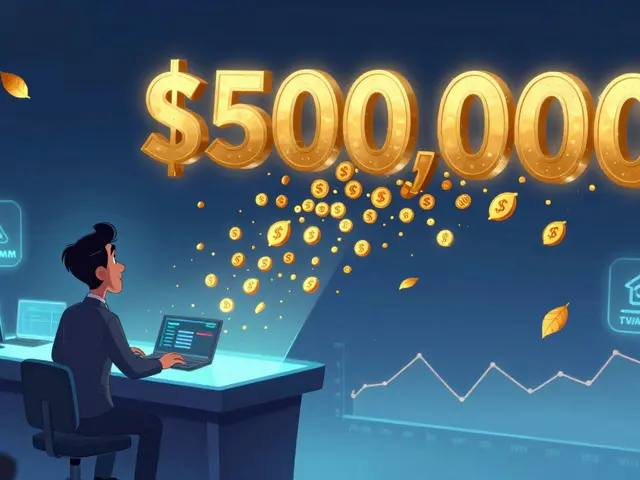
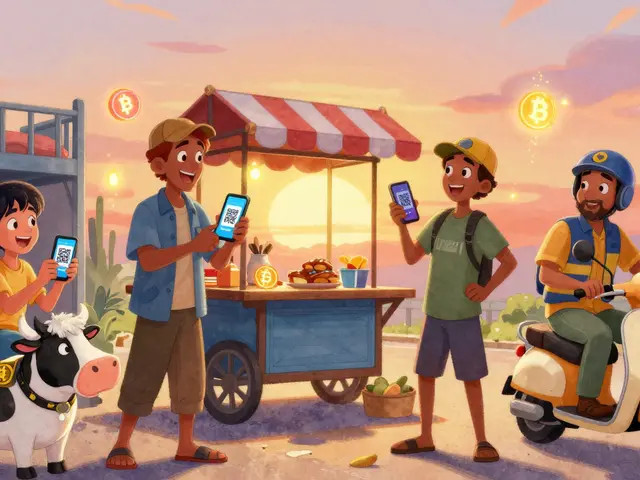
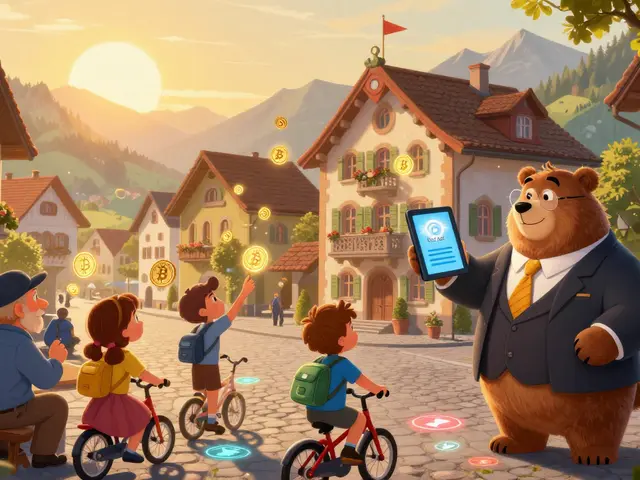
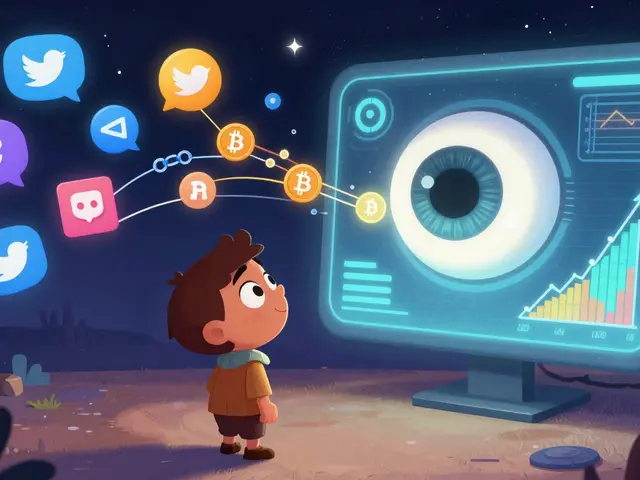
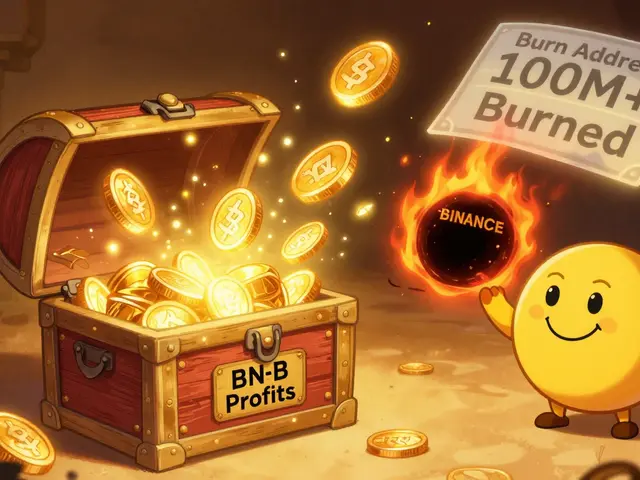
Brian Gillespie
Anonymous team? No audit? 100x promise? Walk away. Done.
Laura Hall
bro i just lost 3k on a coin called 'MoonDoge' because the discord was full of bots saying 'TO THE MOON' and the website looked like it was made in 2017. i thought it was a meme coin, not a trap. lol. never again. 🤡
Michael Heitzer
Most people treat crypto like a slot machine, not an asset class. The real danger isn’t the rug pulls-it’s the mindset that says, 'If it’s pumping, it must be real.' Real projects don’t need hype machines. They need users, utility, and time. The fact that 90+ scams happened in 2024 isn’t a failure of tech-it’s a failure of collective discipline. We’re not investors. We’re gamblers with wallets. And until we stop rewarding the flash and start rewarding the foundation, this cycle will keep repeating. The blockchain doesn’t care if you’re rich. It only cares if you did your homework.
Ainsley Ross
While I appreciate the comprehensive breakdown, I must emphasize that anonymity itself is not inherently malicious. In many jurisdictions, privacy is a human right, and some legitimate projects operate under pseudonymity for safety reasons. What matters is verifiable accountability-proof of past contributions, public GitHub activity, and community engagement over time. A team without names can still be trustworthy if their actions are transparent. The key is not to reject anonymity outright, but to demand demonstrable integrity.
Wayne Dave Arceo
You say 'walk away' like it's that simple. But the real problem is that people don't know how to read a whitepaper, analyze a contract, or verify a lock. They see a chart and a Discord channel and think they're 'in the know.' This isn't crypto literacy-it's cognitive laziness. And if you're dumb enough to invest in a token with no audit, you deserve to lose your money. No one is holding a gun to your head. You chose this. Stop pretending you're a victim.
Rachel Everson
Just wanna say-this is the kind of post that saves people. I showed this to my cousin who just lost $8k on a 'next Solana' token. She didn’t even know what a liquidity lock was. Now she’s using RugDoc.io and checking GitHub commits. Small wins, but they matter. Keep spreading this kind of truth.
Arthur Crone
Everyone’s scared of rug pulls but nobody’s scared of the 1000 other scams. Fake airdrops. Fake staking. Fake NFT drops. Fake influencers. Fake YouTube reviews. You think this is the only way people get ripped off? You’re late to the party. The crypto space is a casino with a blockchain sticker on it. The only safe move is to not play.
Johanna Lesmayoux lamare
My mom invested $500 in a token called 'CryptoBabes' because she saw a girl in a bikini saying 'buy now!' on TikTok. She thinks she's 'part of the revolution.' I don't know whether to laugh or cry. This isn't finance. It's performance art for the gullible.
Ashley Mona
I used to think I was smart until I got burned by a honeypot. Now I check every contract on TokenSniffer before I even open my wallet. And if the team doesn’t have a GitHub with commits from the last 30 days? I scroll past. I’ve saved myself from 7 near-rugs just by being boring. No glam. No hype. Just cold, hard verification. You don’t need to be a genius-you just need to be stubborn.
tom west
Let’s be real-99% of these 'projects' are just code copied from OpenZeppelin with a new token name and a Discord bot that auto-replies 'LFG' to every mention. The fact that people still fall for this shows how little they understand about software development. If you can’t read Solidity, you shouldn’t be investing. Period. No one owes you financial literacy. You have to earn it. And most of you won’t.
Rebecca Saffle
I lost my entire savings on a project called 'Ethereum2.0 Gold' because they had a 'verified' audit from 'CryptoShield'-which was just a site I made in 2 hours. I cried for a week. Now I only invest in BTC and ETH. Everything else is a lottery ticket with extra steps. And I’m okay with that.
ty ty
Wow. You wrote a 10-page essay on how not to be dumb. Congrats. Maybe next time you can write a guide on how to breathe properly. The fact that you had to explain this means you’re surrounded by people who think 'crypto' is a new kind of coffee.
BRYAN CHAGUA
This is exactly the kind of clarity the space needs. Too many people chase returns without understanding risk. I’ve seen friends go from zero to crypto millionaires in their minds-only to lose everything in a week. Education is the only real security. Thank you for writing this. Please keep sharing.
Debraj Dutta
In India, we call these 'chit fund 2.0'. Same game, new tech. People believe in 'next big thing' because they’re desperate for upward mobility. But the truth? Most of these projects are run by guys in Bangalore apartments with 3 laptops and a fake LinkedIn profile. I tell my younger cousins: if it sounds too good to be true, it’s not crypto-it’s con.
dhirendra pratap singh
OMG I JUST LOST MY ENTIRE PORTFOLIO ON A TOKEN CALLED 'SOLANA KILLER 2.0' AND THE TEAM VANISHED WITH 4.7M! THEY EVEN USED A FAKE BSCSCAN AUDIT! I’M SO MAD I COULD SCREAM. WHY DO PEOPLE DO THIS?!?!? I WAS JUST TRYING TO MAKE ENOUGH TO PAY MY RENT!! 😭
Adrian Bailey
Man, I used to be one of those guys who jumped into every new coin with a cute logo and a 100x promise. I thought I was smart because I read the whitepaper (which was just 5 paragraphs copied from a Medium post). Then I got rug-pulled twice and lost over $15k. Now I only look for projects with at least 6 months of GitHub commits, a locked liquidity pool that’s verifiable on Unicrypt, and a team that’s been active on Twitter for over a year. I’m not rich. But I’m not broke either. And honestly? That’s enough. Take your time. Do the work. It’s not sexy, but it works.
Edward Phuakwatana
There’s a deeper layer here: the psychology of scarcity and FOMO is weaponized in crypto. The scammer doesn’t just sell a token-they sell identity. 'You’re not just buying a coin-you’re joining the future.' That’s cult language. And it works because people crave belonging. The real solution isn’t just better tools-it’s better education on cognitive biases. Learn to recognize when you’re being manipulated emotionally, not financially. That’s the real rug pull.
Suhail Kashmiri
bro why are you even here? if you dont know how to spot a rug pull then you shouldnt be in crypto at all. go back to your 9-5 and leave the big boys alone. this post is for people who actually care about not getting robbed. not for people who think 'moon' is a strategy.
Kristin LeGard
Ugh. Another 'do your research' lecture. Like that’s gonna stop the next wave of idiots. The real issue is that these scams are funded by venture capital and promoted by influencers who get paid in tokens. It’s not just individual greed-it’s an entire ecosystem built on deception. Until we regulate the influencers and the exchanges, nothing changes. And don’t even get me started on how Binance still lists these trash tokens.
Arthur Coddington
So… we’re just supposed to sit here and wait for the next apocalypse? Crypto was supposed to be free from banks. Now it’s just Wall Street with worse UX. I’m not investing. I’m not leaving. I’m just… watching. Like a horror movie where you know the killer’s behind the door, but you can’t look away.
Stephanie Platis
It is imperative to note that the absence of a legal entity, coupled with the lack of a formal terms-of-service agreement, constitutes a material red flag under securities law principles-particularly in jurisdictions such as the United States, where the Howey Test may apply. Furthermore, the failure to disclose team token allocations constitutes a violation of fiduciary disclosure norms, regardless of blockchain’s pseudonymous nature. One cannot invoke decentralization as a shield for opacity when capital is being solicited.
Michelle Elizabeth
It’s funny how people treat crypto like it’s a new frontier. It’s not. It’s just the same old pyramid schemes, but with smart contracts instead of pamphlets. And the people who fall for it? They’re not stupid. They’re just tired. Tired of the grind. Tired of waiting. And someone promised them a shortcut. That’s not a flaw in the system-that’s a flaw in us.
Joanne Lee
Thank you for outlining these red flags so clearly. I’ve shared this with my book club-we’re all learning about finance now, even those of us who thought crypto was just 'digital money.' One member asked if it’s possible to audit a project’s social media presence. I said yes: if the engagement feels robotic, if every comment is identical, if there are no dissenting voices, then it’s not a community-it’s a performance. And performances are meant to be watched, not invested in.